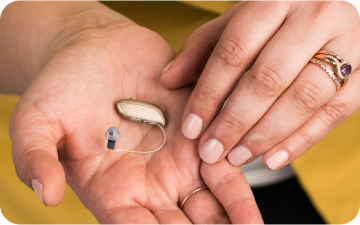Don’t Get Put in the Big Box!
You’ve determined that you’re having trouble hearing, and now you need to do something about it. But where do you go? Who do you see? You’ve probably been bombarded with mailers and ads from local big box hearing aid retailers. You recognize the names like Miracle Ear and Avada and Beltone. But what makes them different from any other local practice or audiologist? Why should you go to one or the other? And what exactly is a “big box” hearing aid retailer?
The Hard Sale
Big box retailers depend on hearing aid sales. They count on you buying their hearing aids. That’s why they apply tactics like offering “free” hearing tests, or special “limited time only” discounts to draw you in. Sometimes they’ll even bring in a closer whose sole job is to convince you to buy their hearing aids. They convince themselves, and you, that these tactics are all in your best interest. They say that you clearly need hearing aids or else you never would have come to them in the first place.
It is never in your best interest to be strong-armed into buying something.
The reason they so badly need you to buy their hearing aids is that they have no other revenue stream. The only time they make money is when you buy a hearing aid. They don’t get reimbursed for professional or diagnostic services. They would rather rake in bigger payments on hearing aid sales than steady revenue from diagnostics. That’s also why they give their employees big commissions, to make sure they capture every sale possible.
The Double-Dip
Many big box retailers are actually owned by hearing aid manufacturers. They make the hearing aids, then sell them to their own stores at a markup. The big box store slaps their own name on the side. They then sell them to you at an even greater markup. So by the time you buy the hearing aids, they’ve been marked up twice! The profits from both markups go to the same place: the manufacturer. And you end up paying for it.
Finding the Right Fit
A reputable audiologist will be honest about your hearing test. They’ll tell you that your need for hearing aids depends a lot on your perceived difficulty, not just the hearing test. They’ll use honest, transparent pricing, so you know exactly what you’re paying for. And, in many cases, they’ll have a good referral relationship with your doctor. Remember, hearing loss is a medical issue and not just a social one. So the best place for you to start your search for a reputable audiologist is usually by asking your physician.

